
The Society of the Muslim Brothers, better known as the Muslim Brotherhood is a transnational Sunni Islamist organization founded in Egypt by Islamic scholar and schoolteacher Hassan al-Banna in 1928. Al-Banna's teachings spread far beyond Egypt, influencing today various Islamist movements from charitable organizations to political parties.
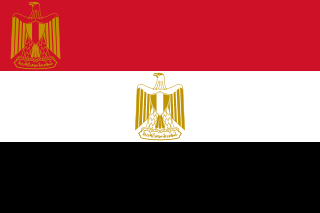
The President of the Arab Republic of Egypt is the executive head of state of Egypt and the de facto appointee of the official head of government under the Egyptian Constitution of 2014. Under the various iterations of the Constitution of Egypt following the Egyptian Revolution of 1952, the president is also the supreme commander of the Armed Forces, and head of the executive branch of the Egyptian government. The current president is Field Marshal Abdel Fattah el-Sisi, who has been in office since 8 June 2014.
According to most scholars the history of modern Egypt dates from the start of the rule of Muhammad Ali in 1805 and his launching of Egypt's modernization project that involved building a new army and suggesting a new map for the country, though the definition of Egypt's modern history has varied in accordance with different definitions of modernity. Some scholars date it as far back as 1516 with the Ottomans' defeat of the Mamlūks in 1516–17.
The Muslim Brotherhood is an Islamic organization that was founded in Ismailia, Egypt by Hassan al-Banna in March 1928 as an Islamist religious, political, and social movement. The group spread to other Muslim countries but has its largest, or one of its largest, organizations in Egypt, where for many years it has been the largest, best-organized, and most disciplined political opposition force, despite a succession of government crackdowns in 1948, 1954, 1965 after plots, or alleged plots, of assassination and overthrow were uncovered. Following the 2011 Revolution the group was legalized, and in April 2011 it launched a civic political party called the Freedom and Justice Party (Egypt) to contest elections, including the 2012 presidential election when its candidate Mohamed Morsi became Egypt's first democratically elected president. One year later, however, following massive demonstrations, Morsi was overthrown by the military and arrested. As of 2014, the organization has been declared a terrorist group by Russia, Egypt, UAE, Saudi Arabia and is once again suffering a severe crackdown.
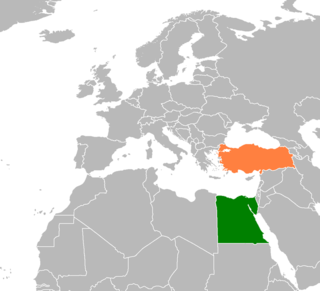
Egypt and Turkey are bound by strong religious, cultural and historical ties, but diplomatic ties between the two have remained extremely friendly at times and extremely strained at others. For three centuries, Egypt was part of the Ottoman Empire, whose capital was Istanbul in modern-day Turkey, despite governor of Egypt, Muhammad Ali, waging war against the Ottoman sultan, Mahmud II, in 1831.

Saudi Arabia and Turkey relations have long fluctuated between cooperation and alliance to enmity and distrust. Since the 19th century, the two nations have always had a complicated relationship. While Turkey and Saudi Arabia are major economic partners, the two have a tense political relationship, deemed from the historic enmity.
The History of Republican Egypt spans the period of modern Egyptian history from the Egyptian Revolution of 1952 to the present day, which saw the toppling of the monarchy of Egypt and Sudan, the establishment of a presidential republic, and a period of profound economic, and political change in Egypt, and throughout the Arab world. The abolition of a monarchy and aristocracy viewed widely as sympathetic to Western interests, particularly since the ousting of Khedive Isma'il Pasha, over seven decades earlier, helped strengthen the authentically Egyptian character of the republic in the eyes of its supporters.
The Arab Cold War was a political rivalry in the Arab world from the early 1950s to the late 1970s and a part of the wider Cold War. It is generally accepted that the beginning of the Arab Cold War is marked by the Egyptian revolution of 1952, which led to Gamal Abdel Nasser becoming president of Egypt in 1956. Thereafter, newly formed Arab republics, inspired by revolutionary secular nationalism and Nasser's Egypt, engaged in political rivalries with conservative traditionalist Arab monarchies, influenced by Saudi Arabia. The Iranian Revolution of 1979, and the ascension of Ayatollah Ruhollah Khomeini as leader of Iran, is widely seen as the end of this period of internal conflicts and rivalry. A new era of Arab-Iranian tensions followed, overshadowing the bitterness of intra-Arab strife.

In Egypt, the Muslim Brotherhood is a Sunni Islamist religious, political, and social movement, with adherents estimated to number between 2 and 2.5 million. Founded by Hassan al-Banna in 1928, the group spread to other Muslim countries but has its largest organization in Egypt, despite government crackdowns in 1948, 1954, 1965 and 2013, after plots, or alleged plots, of assassination and overthrow were uncovered.
Egypt's first experience of secularism started with the British Occupation (1882–1922), the atmosphere which allowed the protection of debate. In this environment pro-secularist intellectuals like Yaqub Sarruf, Faris Nimr, Nicola Haddad who sought political asylum from Ottoman Rule were able to publish their work. This debate had then become a burning issue with the work of Egyptian Shaykh Ali Abdel Raziq (1888–1966), “The most momentous document in the crucial intellectual and religious debate of modern Islamic history”.
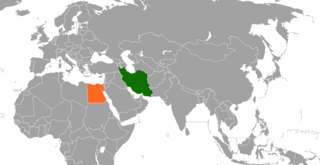
Following the Egyptian Revolution of 2011, Iran appointed its first ambassador to Egypt in almost 30 years. Despite oft-wavering tensions between the two countries, they share membership in the OIC, the BRICS and the Developing 8.

Mohamed Mohamed Morsi Eissa al-Ayyat was an Egyptian politician, engineer, and professor who was the fifth president of Egypt, from 2012 to 2013, when General Abdel Fattah el-Sisi removed him from office in a coup d'état after protests in June. An Islamist affiliated with the Muslim Brotherhood organization, Morsi led the Freedom and Justice Party from 2011 to 2012.

Historically, relations between the Arab Republic of Egypt and the Kingdom of Saudi Arabia could be considered as extending several centuries back to the relations between earlier regimes in Egypt – the highly autonomous Egypt Eyalet in the Ottoman Empire and the Kingdom of Egypt – and the earlier manifestations of Saudi/Wahhabi power in the Arabian Peninsula. Saudi Arabia and Egypt are both highly influential countries in the Arab world. Egypt is the most populous Arab country, and Saudi Arabia is a member of the G20. According to a 2013 Pew global opinion poll, 78% of Egyptians express a favourable view of Saudi Arabia, and 19% express an unfavourable view.
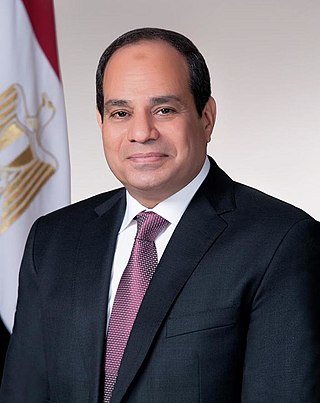
Abd el-Fattah Saeed Hussein Khalil el-Sisi is an Egyptian politician and retired military officer who has served as the sixth and current president of Egypt since 2014. Before retiring as a general in the Egyptian military in 2014, Sisi served as Egypt's deputy prime minister from 2013 to 2014, minister of defense from 2012 to 2013, and director of military intelligence from 2010 to 2012. He was promoted to the rank of Field Marshal in January 2014.

Egypt–Syria relations refers to the bilateral relations between the Arab Republic of Egypt and the Syrian Arab Republic. Egypt has an embassy in Damascus. Syria has an embassy in Cairo. Both countries are members of the Arab League.
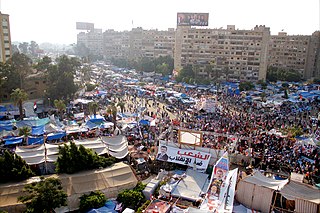
The 2013 Egyptian coup d'etat took place on 3 July 2013. Egyptian army chief General Abdel Fattah el-Sisi led a coalition to remove the democratically elected President of Egypt Mohamed Morsi from power and suspended the Egyptian constitution of 2012. The move came after the military's ultimatum for the government to "resolve its differences" with protesters during widespread national protests. The military arrested Morsi and Muslim Brotherhood leaders, and declared Chief Justice of the Supreme Constitutional Court Adly Mansour as the interim president of Egypt. The announcement was followed by demonstrations and clashes between supporters and opponents of the move throughout Egypt.
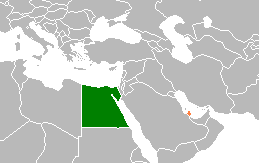
Egypt–Qatar relations are the bilateral relations between the State of Qatar and the Arab Republic of Egypt. They first began in 1972.

Essam El-Haddad is an Egyptian politician. He was a senior advisor for foreign relations for the Muslim Brotherhood in Egypt and the Freedom and Justice Party. In August 2012, he was appointed as one of four Egyptian Presidential assistants with responsibility for foreign relations and international cooperation until the overthrow of Egyptian president Mohamed Morsi in the third of July 2013. He is now in custody in solitary confinement in Al-Aqrab Prison in Cairo.

The Qatar–Saudi Arabia diplomatic conflict refers to the ongoing struggle for regional influence between Qatar and the Kingdom of Saudi Arabia (KSA), both of which are members of the Gulf Cooperation Council (GCC). It is sometimes called the New Arab Cold War. Bilateral relations have been especially strained since the beginning of the Arab Spring, that left a power vacuum both states sought to fill, with Qatar being supportive of the revolutionary wave and Saudi Arabia opposing it. Both states are allies of the United States, and have avoided direct conflict with one another.













